

Table of contents
- causes
- cleaning
- salt and lemon
- baking powder and vinegar essence
- baking soda and citric acid
- soda
- washing powder
- toilet gel
- Boiling water
- prevention
- frequently asked Questions
If the drain in the shower stinks, it can be unpleasant not only during use. Bad smells from the pipes can spread throughout the bathroom. This guide shows how the problem can be solved with home remedies.
causes

Dirt in the drain is usually responsible for the stench. Residues from conditioner and co., hair and dirt are deposited in the pipe and can give off bad odors if they are not removed regularly. Does the drain stink in the shower, these triggers are also possible:
- old water in the siphon
- rising gases from the waste water
- incorrectly installed pipes
- wrong ventilation
- constipation
Occurs not only stench, but runs after the shower the water is also worse, there may be a blockage. On the other hand, is the drain clean and clear, but still smells during heavy rain? Then the problem is often an incorrectly installed siphon that cannot fulfill its function as an odor stop.
Tip:
If, despite cleaning and home remedies, odors keep coming back, you should call in a plumber to get to the bottom of the cause and fix it permanently.
cleaning
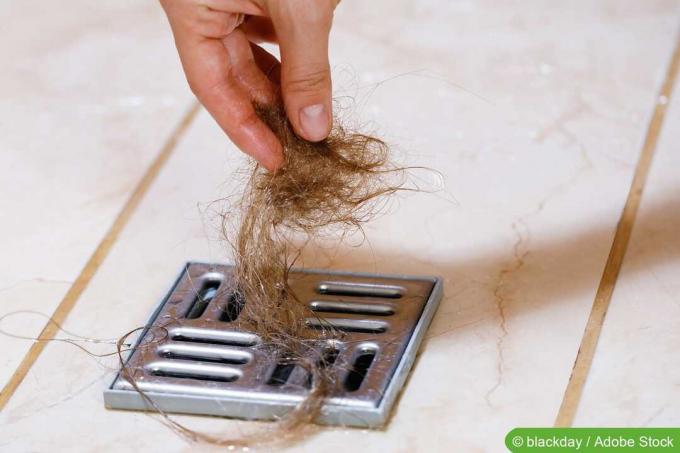
If the drain in the shower stinks, the first step should be to clean the filter and siphon. Wiping out the screen and using a small hook to pull out hair removes gross debris and is easy to do without a plumber. However, deposits in the further course of the pipe are not loosened. A cleaning or neutralizing agent must therefore be used afterwards.
salt and lemon
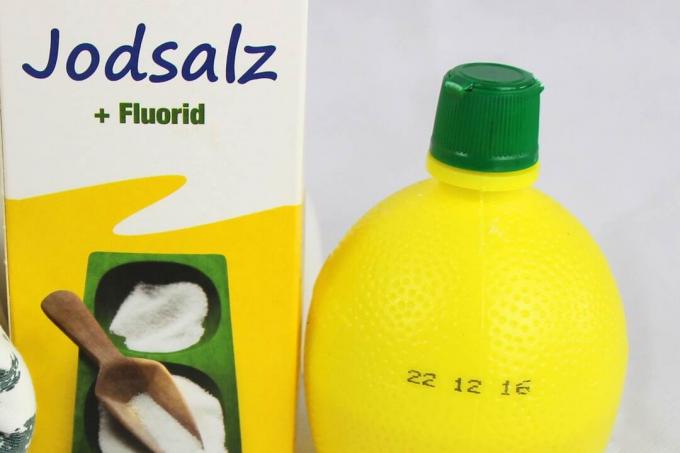
Salt binds moisture and can therefore neutralize bad smells. The application is simple, inexpensive and environmentally friendly.
- Put at least two tablespoons of salt down the drain.
- Leave on for at least 45 minutes.
- After exposure, rinse thoroughly with hot water.
If this alone is not enough, lemon juice can be poured into the drain after using salt and should ideally be left to work overnight. Lemon has a fat-dissolving effect and can therefore remove deposits. It also neutralizes odors.
baking powder and vinegar essence
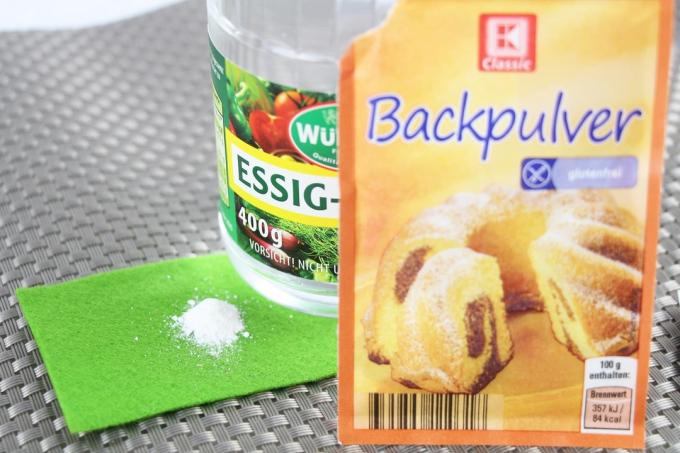
The mixture of baking soda and vinegar foams a lot and can loosen deposits and thus the cause of the smelly drain in the shower. Just like salt, this household remedy is cheap, environmentally friendly and easy to use.
- Pour three to four tablespoons of baking soda down the drain.
- Pour half a cup of vinegar or diluted vinegar essence down the drain.
- Leave on for 15 minutes and rinse off with cold water.
baking soda and citric acid

Baking soda binds odors, citric acid removes deposits and limescale. If the shower stinks, you can pour the two powders mixed down the drain. In combination, both household remedies have a cleaning effect and eliminate the stench. Half a cup of baking soda and citric acid will do.
- Pour into the shower drain and cover with a damp cloth.
- Leave on for about 15 to 30 minutes.
- Then rinse with hot water.
soda

If the drain in the shower stinks, it's also worth using soda or washing soda. The agent is available in drugstores or pharmacies and has a strong cleaning effect. Just two tablespoons of the powder are enough to eliminate odor from the drain. The household remedy is poured in, takes effect for half an hour and is then rinsed with cold water.
washing powder

Detergent powder is designed to clean and fight bad smells. If it gets wet, however, it can stubbornly settle and stick to the pipe. It should therefore only be dissolved in water and poured down the drain. Two teaspoons in one liter of warm water, an exposure time of about 15 minutes and thorough rinsing are usually sufficient to eliminate the bad smell.
toilet gel
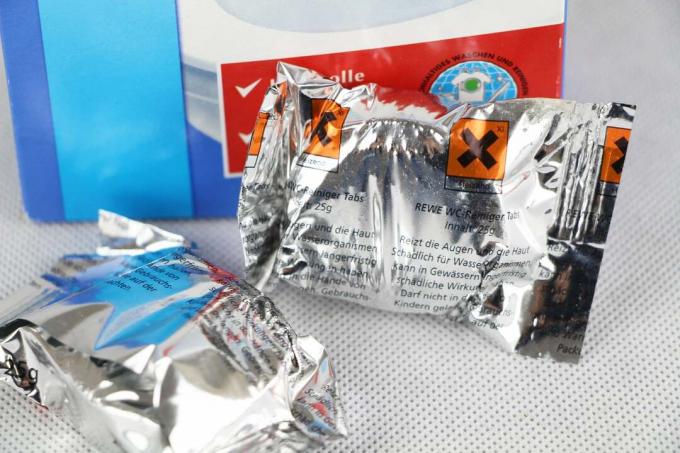
Toilet gel, foam or tabs can also loosen stubborn dirt in the pipes and thus neutralize odours. Tabs can be crumbled for this purpose. A cleaning tablet is usually sufficient for this. The manufacturer's information applies to the exposure time. In any case, the drain should be rinsed thoroughly afterwards to remove residues.
Boiling water

If there are no other means at hand, the drain can be flushed several times with boiling water. Germs are killed and fermentation or putrefaction processes are interrupted, at least for a short time. Adding vinegar, salt or lemon to the water can keep it fresh for longer. Depending on the intensity of the smell and the dirt, several liters of boiling water may be necessary.
prevention
Simple measures can help prevent the shower drain from smelling in the future, or at least reduce the risk of bad odors. These include:
- Clean drain as much as possible
- rinse with hot water after showering
- use home remedies regularly
- Put a strainer over the drain

Tip:
If, despite these measures, the drain in the shower still stinks, it can be thoroughly cleaned with a pipe cleaning spiral and rinsed with diluted chlorine. Use at least ten liters of water to remove mechanically loosened dirt.
frequently asked Questions
Residues from soap, dirt and grease can be subject to rot and fermentation, as can standing water. This releases foul-smelling gases that escape upwards. Blockages, defects or improper ventilation can still contribute to these processes.
In conjunction with thorough rinsing, a large amount of salt can neutralize odours, loosen encrustations and prevent decomposition processes. This effectively counteracts the stench from the shower drain and is a worthwhile preventive measure.
Chemical agents harm the environment and the pipes. Mechanical cleaning and the use of home remedies or calling in a plumber to professionally solve the problem is therefore better.
 Mirko
Mirko
Learn more about water

Water consumption when showering in liters per minute
Anyone who knows how much water is consumed when showering in liters can use this to reduce costs in a targeted manner. Especially with regard to rising energy prices and a more conscious use of resources, there is often an undreamt-of savings potential.

Install check valve vertically or horizontally?
A non-return valve prevents the flow of liquids or gases in the wrong direction due to its operating principle. This makes it an important component, for example, in garden pond pumps or on the heating system. But should it be installed vertically or horizontally? We clarify.

Domestic waterworks: how to increase the pressure
With a domestic waterworks it may be necessary, depending on the depth, to increase the pressure. But how can the setting be made and when is it necessary to make an adjustment? All important information can be found here.
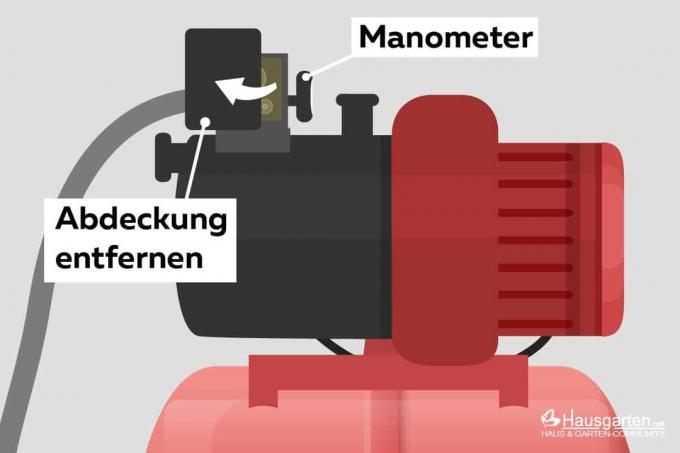
Domestic waterworks: set the pressure correctly
Adjusting the pressure correctly in a domestic waterworks is very easy with the appropriate knowledge. Our guide shows how the measure should be carried out and what to look out for.

Domestic waterworks does not draw water: what to do?
If the domestic waterworks does not draw water, the question arises: what to do? The answer depends on the type of pump and the problem at hand. Our guide shows possible causes and solutions.

Domestic waterworks does not switch off: what to do?
If the domestic waterworks runs continuously and does not switch off, there can be several reasons for this. At the same time, the permanent running of the domestic waterworks poses a significant problem. Here we show what can be done about it.



